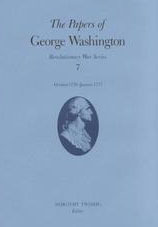- Bible
- Read the Bible
- Bible Versions
- Verse of the Day
- Reading Plans
- Verses by Topic
- Books of the Bible
- Bible Images
- Study
- Commentaries
- Concordances
- Dictionaries
- Encyclopedias
- Sermons
- Bible Atlas & Maps
- BP Wiki
- Devotionals
- Today's Devotionals
- Light of the World
- All Devotionals
- Inspirational Quotes
- More
- Picture Quotes
- Videos
- Inspirational
- Bible Study
- What The Bible Says
- Bible Q&As
- Daily Bread
- Bible by Genre
- Bible Stories
- Random Bible Verse
- Community
- Store
The Papers of George Washington, 7: October 1776-January 1777
by George Washington
Volume 7 documents the dramatic events of the New York campaign and the ensuing New Jersey campaign, a seemingly endless string of American reverses and retreats terminated by surprising victories at Trenton and Princeton. The volume opens with Washington's withdrawal of most of his army from Manhattan Island north to White Plains, where on 28 October British and Hessian troops routed the American right wing on Chatterton hill. Although Washington subsequently succeeded in blocking any further British advance to the north, his indecisiveness about ordering the evacuation of Fort Washington, the sole remaining American post on Manhattan Island, led to the disastrous loss of the fort's large garrison and many valuable stores when General Howe's forces overran it on 16 November.
After the fall of Fort Lee on the west bank of the Hudson River four days later, Washington began retreating across New Jersey with his rapidly dwindling army. His repeated appeals for reinforcement by local militia and Continental troops remaining in New York fell largely on deaf ears, and in early December Washington was obliged to cross the Delaware River into Pennsylvania, leaving New Jersey in enemy hands. From his Bucks County Headquarters Washington wrote his brother Samuel on 18 December: "If every nerve is not strained to recruit the New Army with all possible Expedition I think the game is pretty near up.... No Man I believe ever had a greater choice of difficulties & less the means of extricating himself than I have--However under a full perswation of the justice of our Cause I cannot but think the prospect will brighten." Washington's optimism was justified by his subsequent actions. His daring counterstrokes against a Hessian brigade at Trenton on 27 December and a British detachment at Princeton on 3 January not only reversed the strategic situation but also turned the tide of political defection that had theatened to engulf the middle states.
After the fall of Fort Lee on the west bank of the Hudson River four days later, Washington began retreating across New Jersey with his rapidly dwindling army. His repeated appeals for reinforcement by local militia and Continental troops remaining in New York fell largely on deaf ears, and in early December Washington was obliged to cross the Delaware River into Pennsylvania, leaving New Jersey in enemy hands. From his Bucks County Headquarters Washington wrote his brother Samuel on 18 December: "If every nerve is not strained to recruit the New Army with all possible Expedition I think the game is pretty near up.... No Man I believe ever had a greater choice of difficulties & less the means of extricating himself than I have--However under a full perswation of the justice of our Cause I cannot but think the prospect will brighten." Washington's optimism was justified by his subsequent actions. His daring counterstrokes against a Hessian brigade at Trenton on 27 December and a British detachment at Princeton on 3 January not only reversed the strategic situation but also turned the tide of political defection that had theatened to engulf the middle states.
BUY NOW
Hardcover, 599 pages
Published August 29th 1996 by University of Virginia Press
© 2025 Bibleportal.com All rights reserved.

George Washington was the commander of the Continental Army in the American Revolutionary War (1775-1783) and served as the first President of the United States of America (1789-1797). For his central role in the formation of the United States, he is often referred to as the father of his country.
Washington was baptized into the Church of England. In 1765, when the Church of England was still the state religion, he served on the vestry (lay council) for his local church. Throughout his life, he spoke of the value of righteousness, and of seeking and offering thanks for the "blessings of Heaven."
The Electoral College elected Washington unanimously in 1789, and again in the 1792 election; he remains the only president to receive 100% of the electoral votes.
Washington proved an able administrator. An excellent delegator and judge of talent and character, he held regular cabinet meetings to debate issues before making a final decision. In handling routine tasks, he was "systematic, orderly, energetic, solicitous of the opinion of others but decisive, intent upon general goals and the consistency of particular actions with them.
Washington died in 1799. He has been consistently ranked by scholars as one of the greatest U.S. Presidents.
... Show more